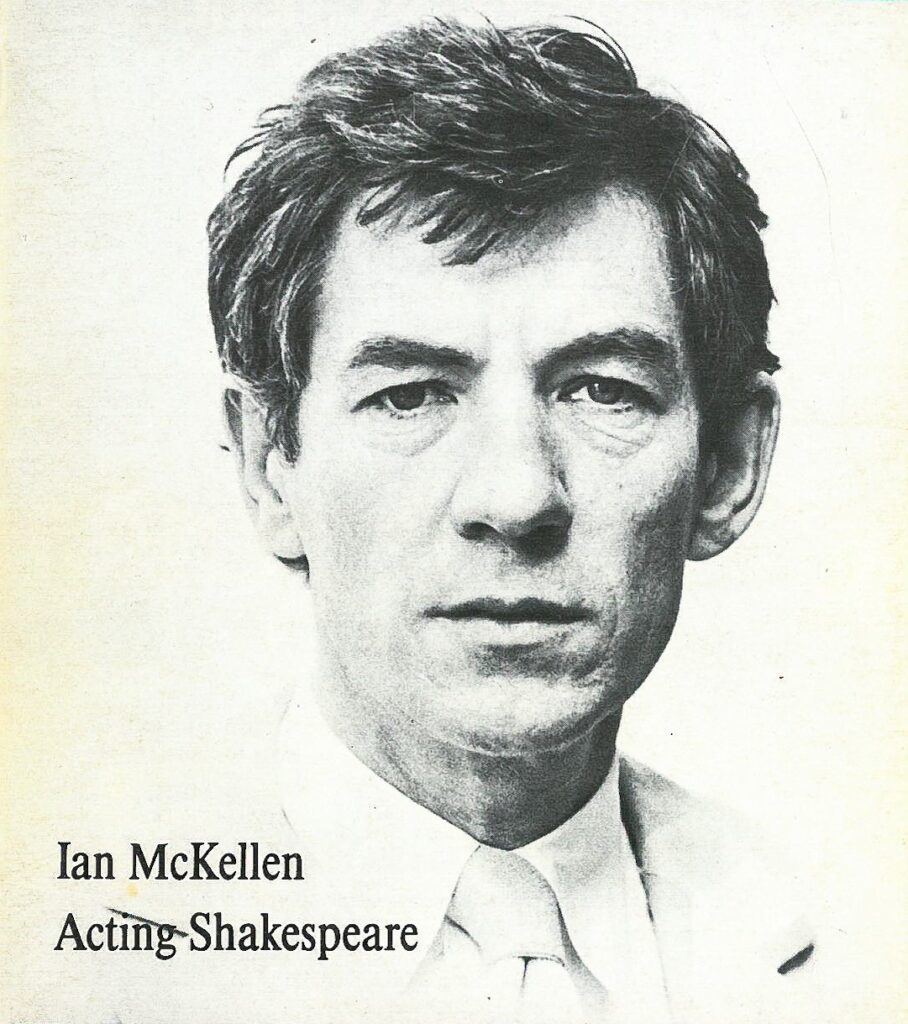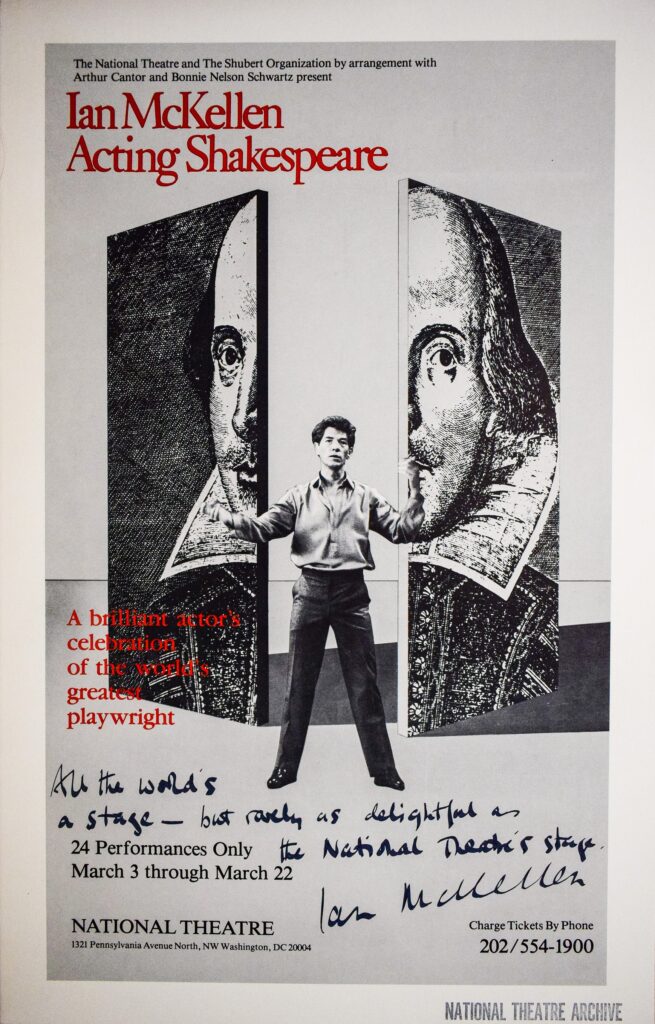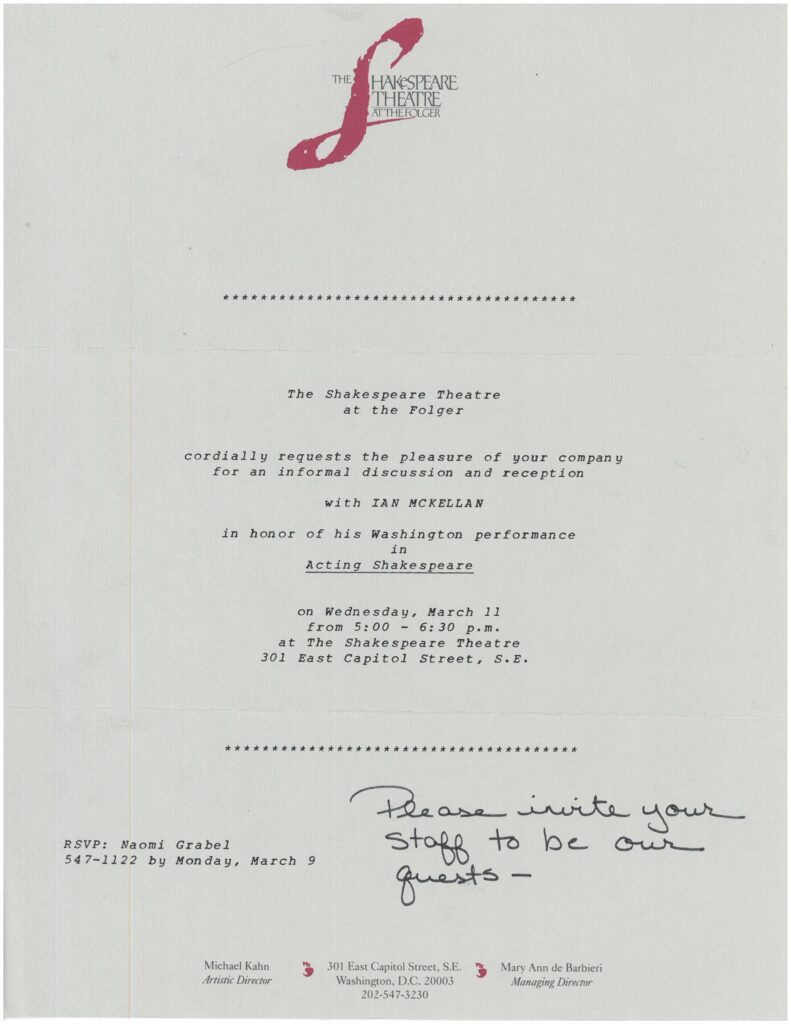By Jared Strange, Director of Education and Community Programs
Published June 27, 2024

It’s hard to imagine a world in which Sir Ian McKellen is not a household name, but that was the case when he made his second visit to The National Theatre in 1987. McKellen had previously appeared at The National in 1980, playing the role of Salieri in Peter Shaffer’s Amadeus prior to its Broadway run, which earned him a Tony Award. This time, he trod the stage alone in Acting Shakespeare, a one-man show that intermingled the Bard’s soliloquies with his own commentary. Back then, the man who would later earn a knighthood, two Oscar nominations, and global fame for portraying such iconic figures as Gandalf the Grey in Lord of the Rings, Magneto in X-Men, and James Whale in Gods and Monsters, was still years away from his blockbuster breakthrough. However, another, more personal breakthrough was just around the corner: coming out.
By March of 1987, Ian McKellen was already widely acknowledged as one of the preeminent stage actors of his generation, and Acting Shakespeare, a solo show of his own invention, represented the perfect showcase for his gifts. It all began with an invitation to present something for the Edinburgh Fringe Festival in 1976. Acting on short notice, McKellen threw together some scenes and pulled a few tricks to hold them together. “I’d scarcely worked out what I wanted to say, let alone learnt the famous speeches,” he recalled in a program note for The National Theatre engagement. “So I had [crib notes] stuffed up my sleeve, with prompts all over the little stage. That might have been the end of it and as I’ve never much liked other people’s one-man shows, I shouldn’t have much missed my own.”
Even after years of tinkering and polish, the show retained a simple, informal appeal. The run script of the American tour that stopped in Washington, a photocopy of which is held in The National Theatre Archives, indicates few set and lighting cues. The only significant set piece was a chair, though getting the right one could prove a challenge (according to the Washington Post, The National’s ideal chair went missing, forcing them to borrow one from the reading room at the Folger Shakespeare Library). Alongside the sparse technical cues in the script are a few small adjustments McKellen made following his Tony-nominated Broadway engagement in 1984. In one sequence, during which he imagines Shakespeare’s childhood encounter with some traveling players, the name “Shakespeare” is scratched out and replaced with “young William,” suggesting a more familiar tone.


Figure 1 (left): A poster for Acting Shakespeare’s 1987 engagement at The National, signed by Ian McKellen. The inscription reads “All the world’s a stage—but rarely as delightful as the National Theatre’s stage,” a reference to a speech by Jacques in As You Like It, which opens Acting Shakespeare. Figure 2 (right): An invitation to a special reception for McKellen offered by the Shakespeare Theatre at the Folger. The Shakespeare Theatre was established in 1986 by Michael Kahn, and later struck out on its own as Shakespeare Theatre Company. Can you spot the typo in this note? Hint: he’s a star by any other spelling.
The play’s simplicity made it eminently portable. Before coming to Pennsylvania Avenue, McKellen took it with acclaim to theatres in Los Angeles, Stockholm, Warsaw, and Jerusalem, a drama school in Moscow (illegally), and even a restaurant in Charlottesville, Virginia. Its global success burnished McKellen’s already great reputation, and he was warmly received in Washington by The National, the Press Club, and the Folger, which had previously enjoyed a selection of Acting Shakespeare for their 50th birthday in 1982. Unsurprisingly, the show was a critical hit. “McKellen is one of England’s most distinguished actors—hell, one of the world’s best,” commented the Washington Post’s Joe Brown. “And in this evening he shows us how and why—with a quicksilver mind that darts about the history and the language, and a face and a voice that hold uncanny sway over the audience, almost like mass hypnosis.”
Despite his successes to this point, McKellen arrived in the capital nursing a few professional wounds. His Broadway turn in Michael Frayn’s Wild Honey, adapted from Anton Chekhov’s Platanov, had ended in disappointment, despite the production having enjoyed success in London, earning McKellen one of his six Olivier Awards. His film career, meanwhile, had yet to really take off. “The reason I’m here [in the United States] is to try to get a movie,” he told the Washington Times’s Hap Erstein. “I would very much like to do more films, and now may be the time to make myself available.” By that point, his film work had been sparse, and it would take several more years before his notoriety approached what it is today.
It was only a few months after playing The National, however, that McKellen reached a more significant and liberating juncture. Friends and colleagues had long known the actor was gay, but it was never something he acknowledged in public. That changed in January of 1988, when he participated in the BBC radio program Third Ear to speak out against Section 28, a parliamentary amendment to the Local Government Act that prohibited the “promotion” of homosexuality by local governments in his native Britain. During the subsequent debate with conservative news editor Peregrine Worsthorne, who supported the bill, McKellen passionately defended gay rights and identified himself as a gay man in public for the first time. This was hugely significant at a time when being openly gay was considered an existential threat to one’s career, certainly for a mainstream performer. Far from retreat, McKellen went on to become a champion of gay rights. In 1989, he became a founding member of Stonewall, a UK-based charity named for the 1969 Stonewall Riots in New York, which is now one of the largest LGBTQ+ advocacy organizations in Europe.
In a 1998 interview with BOMB Magazine, McKellen admitted to having regrets about not coming out until his 40s, including that he did not engage with the “politicking” surrounding gay rights. “All politics means is making connections,” he observed. “I didn’t make connections with my own experience as a gay man [back then].” Today, making such connections as a mainstream public figure is common—even necessary, as legislative efforts to curtail expressions of queer life continue. That was not the case during the 1980s, a period of greater stigma, fewer rights, and weaker work protections for LGBTQ+ people. It goes to show the risks even a successful man like McKellen took to embrace his true self.
In retrospect, the record of McKellen’s second appearance at The National illustrates an enduring performer approaching a time of personal and social change. The man himself stated in a recent interview with Variety that coming made him more emotionally available, which improved not only his personal life but his acting as well. It’s moving and illuminating acknowledgement, especially considering his gift for acting Shakespeare (and so much more) was already so highly praised.
Looking for More?
Visit Sir Ian McKellen’s website to learn more about his work and read a transcript of his appearance on Third Ear. You can also watch the PBS Broadcast of Acting Shakespeare on YouTube. You can also read more stories from our Archives by clicking here.
Sources
Brown, Joe. “The Bard, Beautifully.” The Washington Post, March 6, 1987.
Erstein, Hap. “Actor Buffs Up Brilliant Bard.” The Washington Times, March 6, 1987.
Lang, Brent. “Ian McKellen on Not Retiring, Not Being the First Choice for Gandalf and Going Evil for ‘The Critic’: ‘The Devil Has the Best Lines.’” Variety, September 7, 2023. https://variety.com/2023/film/features/ian-mckellen-retirement-gandalf-the-critic-toronto-1235710798/.
McIntyre, Mike. “McKellen’s Seat of Power.” The Washington Post, March 10, 1987. Read online.
McKellen, Ian. “On Acting Shakespeare.” Stagebill program for Acting Shakespeare (1987), 12.
Mendelsohn, Scott. “Ian McKellen.” BOMB Magazine, October 1, 1998. https://bombmagazine.org/articles/1998/10/01/ian-mckellen/.
Reiter, Susan. “The Grand Challenge.” Stagebill program for Acting Shakespeare (1987), 7, 15-18.
“Third Ear – Section 28.” BBC Archive online. Originally broadcast January 27, 1988.